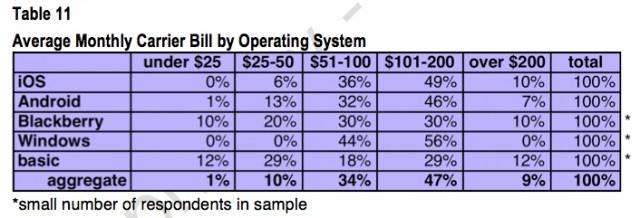iPhone users have the highest carrier bills among all smartphone platforms, with with 10 percent spending more than $200 per month with their carrier.

The data comes from the latest research by Consumer Intelligence Research Partners, which shared the info with All Things D. A total of 59 percent of iPhone users polled between October and December of 2012 indicated they spend more than $100 per month with their carrier, compared to 55 percent of Android users, 40 percent of BlackBerry owners, and 56 percent of Windows Phone users.
None of the iPhone owners polled by CIRP spend less than $25 per month on their bill, while just 6 percent fell in the $25 to $50 range. In comparison, 14 percent of Android users were under $50, and 30 percent of BlackBerry owners had that low of a monthly bill.
In the $51 to $100 range were 36 percent of iPhone owners, with the bulk — 49 percent — spending between $101 and $200 per month.
Carriers pay higher subsidies for Apple's iPhone to lock users into a new two-year contract. As a result, the carriers get customers to commit to monthly plans that are costlier on average than those used by owners of competing smartphones.
Michael Levin, co-founder of CIRP, told All Things D that he believes the difference comes from the fact that "all" iPhone users are on "expensive data plans," while some Android users are un prepaid or unsubsidized plans offered by regional carriers.
Carrier subsidy costs for the iPhone became a focal point for Apple last year, when some market watchers expressed concern that carriers could balk at Apple's higher subsidies. Apple Chief Executive Tim Cook downplayed those concerns last July, noting that the total subsidy that carriers pay is "fairly small" when compared with the monthly payments that carriers collect from their subscribers.
Cook also noted that the iPhone has a lower "churn rate," a term the wireless industry uses to describe the number of customers who leave a carrier in a given time period, He also said that iPhone users are also more likely to have an iPad with a data plan, while Apple's engineering teams work closely with carrier partners in an effort to find the most efficient way of handling data.
"At the end of the day, the carriers want to provide their customers with what their customers want to buy," Cook said. "And so the most important thing for Apple by far is to continue making the best products in the world."


